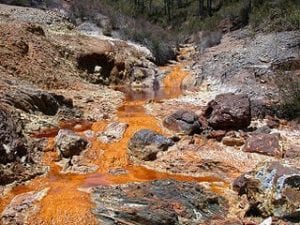The government is hoping to buy time by adopting a short-term solution to the acid mine drainage crisis in Gauteng. Sean O’Beirne, acting head of the environmental affairs department of paratstatal Trans-Caledon Tunnel Authority, said yesterday there was no alternative.
The company plans to install pumps in the Witwatersrand’s central basin, which runs from Roodepoort to Germiston, to partially treat the rising acid water before diverting it into the Vaal River. The pumps are expected to be installed early next year and will be up and running by September. Not implementing the short-term solution, said O’Beirne, would lead to huge amounts of untreated water flowing into the Vaal river system. O’Beirne was speaking at the first of a series of public meetings on the Department of Water Affairs’ short-term solution to the crisis. In October, Department of Water Affairs’ Minister Edna Molewa declared acid mine drainage an emergency and gave the Trans-Caledon Tunnel Authority the green light to deal with it before finalising an environmental impact assessment The assessment will determine the partially treated water’s effect on the environment. Community members at the first public meeting, in Roodepoort yesterday, expressed outrage about Molewa’s decision, calling it a “fait accompli”.They questioned the value of public participation in deciding on a course of action after the emergency decision was made.
Community member Maureen Dosoudil said: “My problem is that high-salt water will be pumped into the Vaal River before the impact assessment is done. I don’t believe in pumping salts into our water without [first] establishing risk. “Nobody knows how the sulphates will affect the Vaal. Something is missing somewhere.” Trans-Caledon Tunnel Authority research analyst Richard Holden said the pumps and treatment plant would be located in a mine shaft half a kilometre south of the Germiston CBD. The water would be pumped into the Elsiespruit, which flows into the Klip River and the Vaal Barrage. O’Beirne said the temporary solution, neutralisation, will remove most of the heavy metals from the water and reduce its acidity – but it will not take away the sulphate or salt load. With treatment, water will contain 2500ml of sulphates per litre instead of the 4000ml in untreated water. O’Beirne said neutralising the water was the best and cheapest solution “for the moment”. http://www.timeslive.co.za/thetimes/2012/11/13/no-options-on-acid-water-strategy






